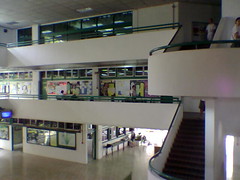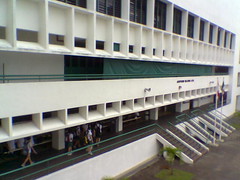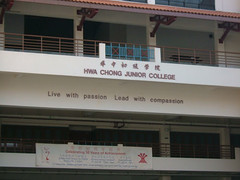Edit (Jul 3, 2005): Singapore Angle has two new posts relating to the Singapore scholarship system.
References/Background reading:
1.Mr Wang
2.Singapore Angle
3.ST article dated 20 June 2005:
June 20, 2005
Embrace elites in order to enrich our society
By Robin Chan
MY APPLICATION to join the 'elite' club was rejected when I failed to score 4 As and a S-paper distinction. My eagerly awaited interview for the prestigious PSC scholarship never materialised. For the first time in my life, I felt vulnerable. The clouds I had been floating on since my days at Raffles Institution suddenly evaporated. I was hurled back into reality and felt like another casualty of 'the system'.
My dreams of overseas study seemingly dashed, it was a while before I summoned up enough confidence to tell myself that I still had the ability to succeed.
I stumbled through NS like an elephant on stilts. It was an awkward and uncomfortable time, but I saw the real struggles of those who had fallen by the wayside. I realised that far from being a casualty, I was still very much a functioning product of 'the system' - I had an education.
I did eventually secure a scholarship that allowed me to go overseas. I was part of the elite again.
There is nothing wrong with an educated or a governing elite. Elitism has become another of those cursed 'isms' - the convenient concoction of complainers.
Elitism is a state of mind, a self-fulfilling prophecy. The more we dislike it, the more it becomes a bane to our society. There will always be casualties, given the meritocratic nature of our system. Which system has no flaws?
Let's turn elitism on its head. We should not let the educated elite be the be-all and end-all of our society. Since we each have a myriad of talents, there is space to create many kinds of elites, and society will be richer for it.
The writer is a second-year student majoring in International Political Economy at Georgetown University in Washington, DC.
Addendum: A
quick search on google reveals that he was awarded a SPH scholarship in 2004. Future Sg journalist! :)
-----------------------------------------------------------------------------
There are so many things I find wrong with that piece that I don't even know where to start. I like the way Mr Wang dissects the letter. It also brings back memories of an earlier period, a time when I would have identified strongly with him. It's a pity I find, that having spent a year in college hasn't really opened his eyes from that 'elitist' view ingrained in him since his days at RI/RJC. Maybe he is just
"living life as a bystander" overseas.
Then again, his views aren't unique amongst students from the top-tier sec schools/JCs.
Want a glimpse of life as a typical Singaporean scholar overseas? Read
this.
L'oiseau rebelle, in her comment to
my earlier piece asks:
"How, then, do you think the (Singapore academic) system can be improved?"My argument goes that the current system is not just an academic class difference, but an economic one too. Unfortunately I can only speak from personal encounters (which can be totally different from the larger picture). Many of my peers being awarded the overseas scholarships could very well afford to go on their families' funds. They had both the grades
and the money. And whenever I hear about the various increases in fees (like public transport, utilities, HDB housing etc), I think about them and wonder if the scholars (through which the ruling elite draws its source from) really understand what exactly is happening on the ground to the common man.
Jhuprincess puts it well (and it mirrors my own experience):
"In my 6 years here, I have mixed with both scholars and non-scholars, Singaporeans and non-Singaporeans. In general, Singaporean scholars care a lot about grades, simply because they have to. And they also complain. A lot. Not that they don't have a right to. Anyone has a right to complain about their lot in life. But it does irk me a bit. In addition to getting full tuition paid, housing stipends, book stipends, clothing stipend, they receive a salary. And this is straight out of high school. They get paid like they've already graduated from college. And they keep getting pay increments. So yes, while they may say that they are bonded. They may not make as much as their counterparts. But if you sit down and do the calculations. How much their counterparts had to pay while they were in school on no scholarship, and how they had to start at the bottom rung. It all evens out in the end. But no, they grouse about how little they are getting. I, on the other hand, made full use of the 20 hours allowed by INS to work in school, and I worked 40 hours per week over the summer. Not much, but it paid my living expenses. Granted, I can't do that now, which is why I always feel ultra guilty, but I did it when I was an undergraduate. My parents sacrificed a lot to make sure that bills were paid on time. The scholars had the option to go on trips, go shopping every weekend or watch a movie every weekend. I didn't. I had to work on fri and sat nights. Yes, that's my choice. I chose to come here knowing full well it was going to be expensive. But they made the choice to take the scholarship. The key word is "choice". Once you've made your bed, lie in it. You made the choice to take the scholarship, accept the damm responsibility of fulfilling your bond. Why burn the bridges? A job is a job."I was fortunate to be awarded a partial (no bond) scholarship and a summer internship that paid for my living expenses for one semester and a chance to go work/travel in a third country (outside of US).
On a related issue, consider the strong links between being shortlisted for OCS and one's chances for a Sg government scholarship. Extend it to the broader picture of being chosen for the 'elite' club. From a male Sg scholar's
blog entry:
"...I was admittedly rather disappointed having not made it into any of the leadership courses after BMT. Did think that all the scholarship chances would go up in smoke. I still remember an interview I had where the interviewer, who was obviously an officer during his ns days, declared that if I didn't make it to OCS, he wouldn't want to see me in the organisation. Thankfully, his views didn't extend to the other scholarship organisations I'd applied for."And the typical scholar background I was talking about:
"...And interacting with a bunch of people, whom I would never have met within the very limited social circle I usually hang out with. Soccer betting, cigarettes, computer games, chionging zouk, 4D and toto, anime and manga, spending all their allowance within 2 weeks of pay day, cashing out all their ERS shares the moment they were issued them... a glimpse into the everyday lives of other singaporeans, singaporeans who are not doctors, lawyers, scholars, professionals, who I have been surrounded by most of my life. Very refreshing and eyeopening."While there is much debate on the scholarship issue (for the 'elite' citizens), some FTs have their say on the ease on which they are being
offered local scholarships for studies in NUS:
"If you would do away with automatic scholarships I would be very much appreciate it. Especially when you automatically give people scholarship with six years bond without asking. We’re not donkeys who will just take whatever you offer us. Some of us might be poor, but forcing us to take such scholarships (by telling us that if we didn’t take this, our chance of getting the bond-free scholarships, i.e. ASEAN/NUS scholarship, is very slim. Oh, you even told the 4As, 2Ds students, my, my!) is at the least of it, immoral."







